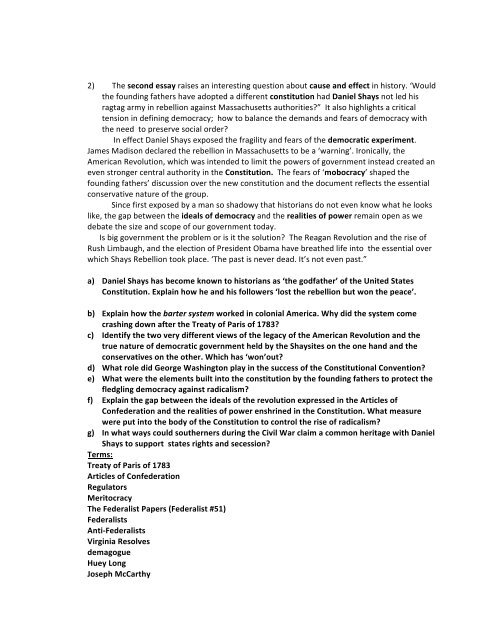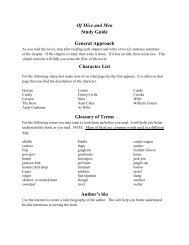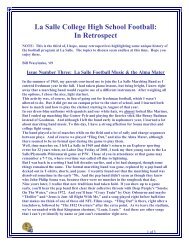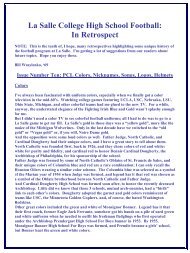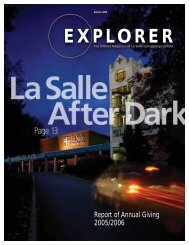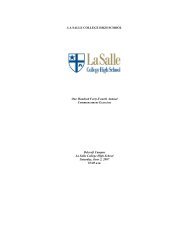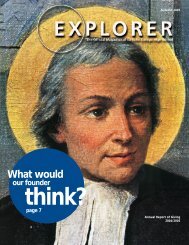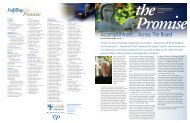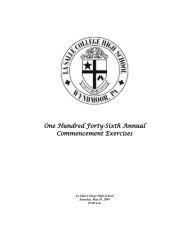10 Days That Unexpectedly Changed America
10 Days That Unexpectedly Changed America
10 Days That Unexpectedly Changed America
Create successful ePaper yourself
Turn your PDF publications into a flip-book with our unique Google optimized e-Paper software.
<br />
<br />
2) The second essay raises an interesting question about cause and effect in history. ‘Would <br />
the founding fathers have adopted a different constitution had Daniel Shays not led his <br />
ragtag army in rebellion against Massachusetts authorities?” It also highlights a critical <br />
tension in defining democracy; how to balance the demands and fears of democracy with <br />
the need to preserve social order? <br />
In effect Daniel Shays exposed the fragility and fears of the democratic experiment. <br />
James Madison declared the rebellion in Massachusetts to be a ‘warning’. Ironically, the <br />
<strong>America</strong>n Revolution, which was intended to limit the powers of government instead created an <br />
even stronger central authority in the Constitution. The fears of ‘mobocracy’ shaped the <br />
founding fathers’ discussion over the new constitution and the document reflects the essential <br />
conservative nature of the group. <br />
Since first exposed by a man so shadowy that historians do not even know what he looks <br />
like, the gap between the ideals of democracy and the realities of power remain open as we <br />
debate the size and scope of our government today. <br />
Is big government the problem or is it the solution? The Reagan Revolution and the rise of <br />
Rush Limbaugh, and the election of President Obama have breathed life into the essential over <br />
which Shays Rebellion took place. ‘The past is never dead. It’s not even past.” <br />
<br />
a) Daniel Shays has become known to historians as ‘the godfather’ of the United States <br />
Constitution. Explain how he and his followers ‘lost the rebellion but won the peace’. <br />
<br />
b) Explain how the barter system worked in colonial <strong>America</strong>. Why did the system come <br />
crashing down after the Treaty of Paris of 1783? <br />
c) Identify the two very different views of the legacy of the <strong>America</strong>n Revolution and the <br />
true nature of democratic government held by the Shaysites on the one hand and the <br />
conservatives on the other. Which has ‘won’out? <br />
d) What role did George Washington play in the success of the Constitutional Convention? <br />
e) What were the elements built into the constitution by the founding fathers to protect the <br />
fledgling democracy against radicalism? <br />
f) Explain the gap between the ideals of the revolution expressed in the Articles of <br />
Confederation and the realities of power enshrined in the Constitution. What measure <br />
were put into the body of the Constitution to control the rise of radicalism? <br />
g) In what ways could southerners during the Civil War claim a common heritage with Daniel <br />
Shays to support states rights and secession? <br />
Terms: <br />
Treaty of Paris of 1783 <br />
Articles of Confederation <br />
Regulators <br />
Meritocracy <br />
The Federalist Papers (Federalist #51) <br />
Federalists <br />
Anti‐Federalists <br />
Virginia Resolves <br />
demagogue <br />
Huey Long <br />
Joseph McCarthy


